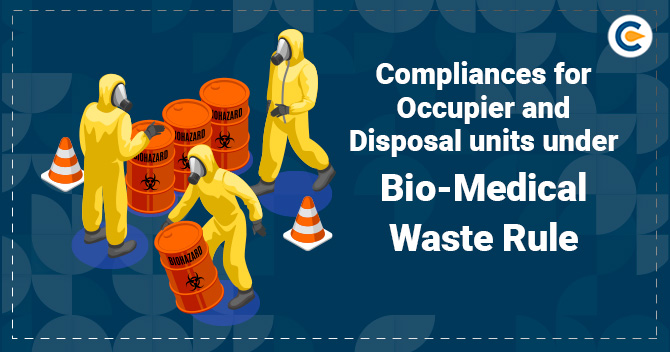Bio Medical Waste Rules came to existence to improve the accumulation, sorting, processing, treatment, & disposal of these bio-medical wastes thereby, minimizing the waste generation and its adverse impact on the environment. This blog unveils the compliances for occupier and disposal units under the said rules.
To whom Bio Medical Waste Rules are applied?
Bio Medical Waste Rules encompass all persons who generate, accumulate, receive, store, treat, transport, dispose bio medical waste in any form including, health care facilities, dispensaries, veterinary clinics, pathological labs, blood banks, clinical facilities, health camps, surgical camps, first aid rooms, forensic lab and research labs.
Compliances for occupiers under Bio Medical Waste Rules
Occupiers falling under Bio Medical Waste Rules are obligated to;
- Take relevant measures to ensure that the handling of bio-medical waste does not pose risk to human life and environment.
- Implement provisions within the facility for safe, aired and secured premises for storage of sorted biomedical waste in colored bags in the way as mentioned under Schedule I, to ensure that there shall be no further handling, pilferage of recyclables, or spillage by animals and the waste from such place shall be channelized in the way as advisable under these rules to the common treatment unit or for the apt treatment and disposal, in the way as cited in Schedule I;
- Pre-heat the lab waste, blood samples, and blood bags via sterilisation or disinfection on-site in the way as recommended by the WHO[1] or National AIDs Control Organisation norms and then channelized to the treatment unit for final disposal;
- Phase out utilization of chlorinated gloves, plastic bags, and blood bags within two years from the notification date of these rules;
- dispose solid waste (not being bio-medical waste) as per the norms of respective waste management rules
- Avoid channelization of bio-medical waste to municipal solid waste;
- Facilitate apt training to all its personals engaged with the handling of bio medical waste at the induction phase and thereafter at least once every year and the information of training programmes executed, no. of worker trained and no. of personal lacking proper training shall be included in the Annual report;
- immunise all its workers and personals engaged with the handling of bio-medical waste for protection against fatal diseases including Tetanus and Hepatitis B that are transmittable, in the way as cited under National Immunisation Policy or the norms of the Ministry of Health and Family Welfare come to effect from time to time;
- Set up a bar-code system for bags filled with bio-medical waste to be channelized out of the facilities for any purpose within one year from the notification date of these rules;
- Ensure apt segregation of chemical waste exists in liquid state and ensure pre-treatment prior to mixing of other waste generate from health care units;
- Ensure apt treatment & disposal of liquid-based waste as per the Water (Prevention and Control of Pollution) Act, 1974 ( 6 of 1974);
- Ensure occupational safety for all its personals and worker dealing with handling of biomedical waste by facilitating apt personal protective equipments;
- Conduct health check at the induction phase and at least once in a year for all its personals and workers dealing with the handling of bio- medical waste and administer the records for the same
- Maintain & update daily the register relating to bio-medical waste management and manifest the monthly record on its official site as per the waste generate on account of category and colour coding as cited Schedule I;
- Report accidents including accidents triggered by fire, blast during handling of biomedical waste and relevant action taken and the records concerning thereto, (including nil report) in form 1 to the respective authority along with the annual report
- Make accessible the annual report on its official website and all the health care units shall make separate website within two year from the notification date of these rules
- Intimate the respective authority promptly in case the facility’s operator failed to collect the bio-medical waste within prescribed duration
- Setup a system to examine and track the undertaking related to bio-medical waste management, either via an prevailing committee or by establishing a new one. The said committee shall participate in meeting once in every six months and the documents of the minute of meetings shall be furnished along with annual report to the respective authority
- Health care units having less than 30 beds shall appoint an eligible person to track the activities related to bio-medical waste management within the facility and furnish the annual report;
- Maintain record concerning incineration’s operation, hydro or autoclaving etc for the duration of five years
- Upgrade Prevailing incinerators to meet the norms for treatment and disposal of bio-medical waste as cited in Schedule II for retention time in Dioxin, secondary chamber, and Furans within two years from the notification date
Compliances for operator of bio-medical waste treatment and disposal facility
Bio-medical waste treatment and disposal units under said rules are obligated to;
- take relevant measures to ensure that the bio-medical waste accumulated from the occupier is channelized, handled, stored, processed, and disposal of, without any negative effect to the human life and the environment, as per the with these norms released by the Central Government or by the CPCB from time to time
- Ensure timely accumulation of bio-medical waste from the occupier’s facility as cited under these rules;
- Set up bar coding and GPS for management of bio- medical waste within one year
- Intimate the respective authority promptly regarding the occupiers which are complying with handling norms
- Facilitate training for all its personals and worker in handling of bio-medical waste during induction phase and at least once a year thereafter;
- Support the occupier in training executed by them relating to bio-medical waste management;
- Undertake apt medical test during induction phase and at least once in a year and immunise all personals and workers dealing with the handling of bio-medical waste for protection against dangerous diseases, including Tetanus and Hepatitis B, that are transmittable while handling medical waste and administer records for the same;
- Ensure occupational safety for all its personals and worker dealing with handling of biomedical waste by facilitating apt personal protective equipments;
- Report accidents including accidents triggered by fire, blast during handling of biomedical waste and relevant action taken and the records concerning thereto, (including nil report) in form 1 to the respective authority along with the annual report
- Maintain a log record for each of its equipment of treatment according to weight of batch; categories of waste underwent treatment process, date and time of treatment cycle and net hours of operation;
- Enable occupier to determine whether the treatment is performed in accordance with the rule;
- Shall manifest details of treatment, authorisation, annual report etc on its official website;
- Post ensuring treatment by microwaving or autoclaving followed by shredding or mutilation, whichever is applicable, the recyclables from the bio-medical wastes underwent treatment process such as bio-medical wastes, shall be confer to recyclers having authorisation from the concerned SPCB or PCC;
- Channelize non-chlorinated plastic coloured bags to the premises of occupier on the chargeable basis, if required;
- Common bio-medical waste treatment unit shall ensure accumulation of biomedical waste on holidays also;
- Maintain record concerning incineration’s operation, hydro or autoclaving etc for the duration of five years
- (q) Upgrade Prevailing incinerators to meet the norms for treatment and disposal of bio-medical waste as cited in Schedule II for retention time in Dioxin, secondary chamber, and Furans within two years from the notification date
Conclusion
Bio Medical Waste has a severe impact on human life as well as environment. Also, it has the potential to invite deadly diseases including tetanus and Hepatitis B. Bio Medical Waste rules seek to ensure comprehensive protection against such mishaps through apt management of said wastes.
Read our Article:An Overview on E-waste Management Techniques in India











